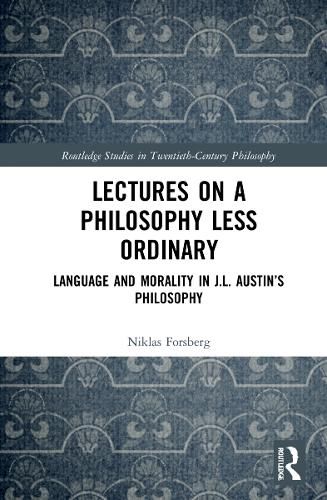Readings Newsletter
Become a Readings Member to make your shopping experience even easier.
Sign in or sign up for free!
You’re not far away from qualifying for FREE standard shipping within Australia
You’ve qualified for FREE standard shipping within Australia
The cart is loading…






This book offers a comprehensive reinterpretation of J.L. Austin’s philosophy. It opens new ways of thinking about ethics and other contemporary issues in the wake of Austin’s philosophical work.
Austin is primarily viewed as a philosopher of language whose work focused on the pragmatic aspects of speech. His work on ordinary language philosophy and speech act theory is seen as his main contribution to philosophy. This book challenges this received view to show that Austin used his most well-known theoretical notions as heuristic tools aimed at debunking the fact/value dichotomy. Additionally, it demonstrates that Austin’s continual returns to the ordinary is rooted in a desire to show that our lives in language are complicated and multifaceted. What emerges is an attempt to think with Austin about problems that are central to philosophy today-such as the question about linguistic inheritance, truth, the relationship between a language inherited and morality, and how we are to cope with linguistic elasticity and historicity.
Lectures on a Philosophy Less Ordinary will appeal to scholars and advanced students working on Austin’s philosophy, philosophy of language, and the history of analytic philosophy.
$9.00 standard shipping within Australia
FREE standard shipping within Australia for orders over $100.00
Express & International shipping calculated at checkout
This book offers a comprehensive reinterpretation of J.L. Austin’s philosophy. It opens new ways of thinking about ethics and other contemporary issues in the wake of Austin’s philosophical work.
Austin is primarily viewed as a philosopher of language whose work focused on the pragmatic aspects of speech. His work on ordinary language philosophy and speech act theory is seen as his main contribution to philosophy. This book challenges this received view to show that Austin used his most well-known theoretical notions as heuristic tools aimed at debunking the fact/value dichotomy. Additionally, it demonstrates that Austin’s continual returns to the ordinary is rooted in a desire to show that our lives in language are complicated and multifaceted. What emerges is an attempt to think with Austin about problems that are central to philosophy today-such as the question about linguistic inheritance, truth, the relationship between a language inherited and morality, and how we are to cope with linguistic elasticity and historicity.
Lectures on a Philosophy Less Ordinary will appeal to scholars and advanced students working on Austin’s philosophy, philosophy of language, and the history of analytic philosophy.